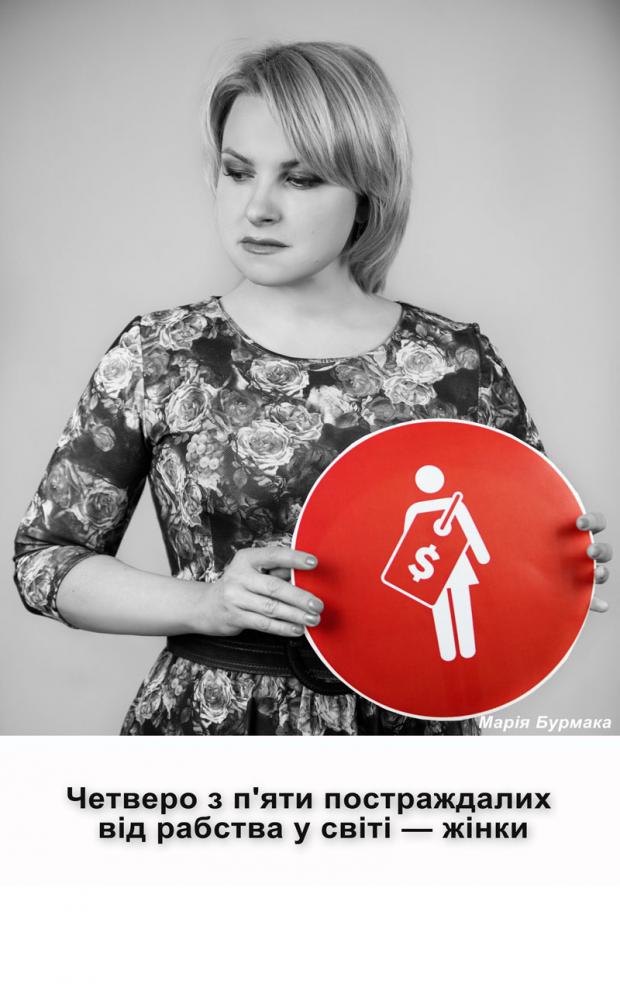#LiveFree: OSCE Project Co-ordinator warns Ukrainians of human trafficking risks
The International Day for Abolition of Slavery, 2 December, is when we focus our minds on eradicating contemporary forms of slavery, such as trafficking in human beings. Learn about our work to combat this scourge in Ukraine.
“Human trafficking and slavery are the challenges of our century, so we cannot remain silent about it,” say Ukrainian pop duet Anna and Maria Opanasyuk, better known as the pop duet ‘Anna-Maria’.
The twins were speaking and singing at an exhibition of posters in central Kyiv warning people about the different kinds of slavery, trafficking in human beings and exploitation in Ukraine. On one poster the duo are holding red signs with illustrations of people emblazoned with a chain and a price tag.
Anna-Maria are some of the faces of the #LiveFree campaign ("Живи вільно" in Ukrainian), which is supported by the OSCE Project Co-ordinator in Ukraine, as well as Ukraine’s Ministry of Social Policy and the NGO A21, and was launched in the summer of 2016. Since then to the end of November, almost 400 billboards and street signs featuring local celebrities with warnings about the risks of trafficking and exploitation were displayed in 12 regions across the country and in Kyiv.
“If this projects helps just one person, this will be already a victory!” say Anna-Maria.
Engaging the Police
Over the last ten years, the Project Co-ordinator has undertaken a range of activities to confront the challenge of human trafficking in Ukraine. It has developed and conducted training programmes on combating trafficking in human beings for the National Police of Ukraine, in close co-operation with La Strada-Ukraine and the International Organization for Migration. Recently the OSCE Project Co-ordinator successfully advocated for the inclusion of special courses on combating human trafficking into the educational curricula of the newly reformed Ukrainian Police units.
“The overall number of registered trafficked persons has continuously decreased in Ukraine in the last ten years from roughly 380 in 2006 to 111 in 2015,” says Ihor Malakov, Deputy Head of the Department for Combating Crimes related to Human Trafficking at the National Police of Ukraine. “In the first ten months of 2016 the Police registered 96 cases.”
Malakhov says that despite the falling number of registered victims, human trafficking remains a widespread and persistent problem in the country.
The false promise of work
The Ukrainians most at risk of becoming potential trafficking victims are from rural areas with limited access to employment opportunities. For that reason the Project Co-ordinator conducts and supports various programmes all over the country to raise awareness among Ukrainians about the risks associated with the various forms of this crime. These forms not only related to sexual exploitation, but also to forced labour, begging and the removal of human organs.
“Job offers abroad are usually very attractive and inviting, particularly when no specific professional skills are needed,” says Tetyana Rudenko, National Project Manager in the OSCE Project Co-ordinator’s Human Security Programme. “In order for citizens to stay safe, I strongly advise them to double-check every detail before accepting such offers. Call the relevant authorities and hotlines, consult experts from the state and non-state institutions dealing with human trafficking and migration issues, and last but not least, think it over with your relatives and friends.”
This is the kind of advice that Tetyana provides when working with vulnerable communities. It is also the central message of awareness-raising campaigns conducted by the Project Co-ordinator, and of economic empowerment projects. These projects enable vulnerable groups to create sustainable social business models and provide them with job skills in critical fields for which well-paid jobs are available. The idea behind it is that a sufficient and sustainable income at home decreases the likelihood of accepting deceptive job offers where people may be exploited.
The #LiveFree project was established by Natali Turchanevich, producer and photo-shooter, who is responsible for creative ideas and producing the project, and Julia Sachenko, Manager of A21, an international organization fighting for abolishing slavery in the 21st century. The photos were shot by Los Angeles-based photographer Oleg Bogdan (www.olegbogdan.com).





